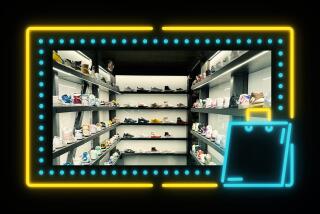Antiquers Hit the Jackpot With 5 Slots
- Share via
If there’s not enough sin in your life, but you’re not quite ready for a bleary night in a cheap motel, consider buying yourself a slot machine.
A slot machine is just a little naughty. Sure, you can theoretically lose the farm playing on one, but if it’s a nickel machine it’s got to be a really small farm, you have to have really bad luck and you have to be willing to stand in front of the machine for a really long time. There are, after all, only so many nickels in the world.
No nickel slots left, you say? It’s all quarters and silver dollars in Vegas now, you say? Well, who said anything about Vegas? I’m not talking about those soulless computer chip demons that hum when they should clank, those information-age automatons that just suck up your money without even having the decency to buzz or rattle or ring bells at you.
No, I’m thinking of those big, glorious lumps of heavy metal and wood that shook and banged and razzed and whooped and clattered around like a tethered locomotive when the three black BAR stripes whirled up in the little windows and chunked to a stop. The real slot machines, the ones everybody called “one-armed bandits”--bulletproof, enchantingly gaudy, a thoroughly satisfying brush with vice.
Unfortunately, Las Vegas (being Las Vegas) doesn’t want that sort of thing in its casinos anymore. Fortunately, you can have it in your living room.
In a small shop in Westminster with the huge red words SLOT MACHINES above the door, Greg and Judy Falletich buy, sell, trade and restore antique slot machines, catering to the crowd that likes its conversation pieces to talk back.
That, in the main, is what these specimens are, said Judy: investment-quality gee-whiz items for the den, the game room or that odd corner of the house that needs to be jazzed up to the maximum.
What they are not, however, are gambling implements, at least legally. According to California law, she said, no slot machine can be sold that was manufactured after 1956, and they absolutely cannot be used for the purpose for which they were originally built (no clandestine back-yard casino nights).
Also, she said, all machines for sale in California must have been made in America and must retain three-fourths of their original exterior fasteners and castings. This is evidence that the machine is original and not a reproduction, which--you guessed it--is illegal in California.
The machines appear to be blue chip as an investment, Judy said. Depending on the rarity of a particular machine, she said, the value can escalate as much as 10% to 25% a year.
The reason is scarcity. Much of the current inventory in antique slot machines sits in collectors’ homes. Many were junked by casinos after they became obsolete. And, Judy said, some continue to sit gathering dust in attics, closets and garages, tucked away by people who “still think it’s illegal to have one.”
What determines value? Mainly rarity, Judy said. Any machine that operates on quarters or pennies (uncommon during the 1940s and ‘50s, the heyday of the machines) is worth more. Also, anything that makes the machine unique in operation or appearance jacks up the price.
One example of this in the current Falletich inventory is a rare machine manufactured by the Rol-A-Tor Company. It features 24-karat gold plating on its facade and it dispenses gum balls as well as jackpots. Judy estimated its worth around $10,000.
Occasionally a real find comes through the door, Judy said. The Falletichs are restoring a 1901 Mills Dewey machine in which a large rotating wheel takes the place of the more familiar three tumblers. She said it’s expected to sell for around $15,000.
That sort of figure, however, is unusual.
Plainer machines can be had for around $1,800, she said, and most top-end machines go for about $7,000. A machine gets value bonus points if it’s emblazoned with the name of a particular casino (which, said Judy, can raise the price as much as 20%) or if it is fitted with decorative lighting.
An intact and detailed “pay card”--a printed or engraved explanation of payouts fitted onto the front of the machine--also hikes the price.
Apart from the machines that light up, none of the slots need electricity to run; the mechanism is entirely mechanical and driven by that all-important pull on the lever.
And the money doesn’t just disappear into the maw of the machine forever.
When you buy your slot machine, you also get a key to the cash box. Many owners, said Judy, use the machines as big, noisy piggy banks.
“They’ll use them to collect laundry money,” she said, “or they’ll save up for a trip to Hawaii.”
Where they can rest up from all that sinning.
More to Read
Sign up for The Wild
We’ll help you find the best places to hike, bike and run, as well as the perfect silent spots for meditation and yoga.
You may occasionally receive promotional content from the Los Angeles Times.






